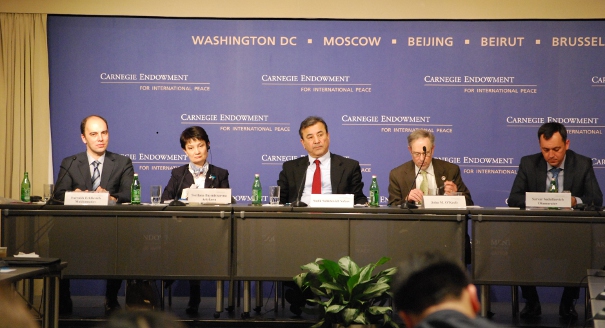{
"authors": [
"John O'Keefe",
"Sodik Safaev",
"Svetlana Artykova",
"Shodieva Normurodovna",
"Sobir Jabborov",
"Sarvar Otamuratov",
"Khayrullo Ruzmetov",
"Tulkin Abdusattarov",
"Farrukh Mukhamedov",
"Ulugbek Khanaev"
],
"type": "event",
"centerAffiliationAll": "dc",
"centers": [
"Carnegie Endowment for International Peace"
],
"collections": [],
"englishNewsletterAll": "",
"nonEnglishNewsletterAll": "",
"primaryCenter": "Carnegie Endowment for International Peace",
"programAffiliation": "russia",
"programs": [
"Russia and Eurasia"
],
"projects": [],
"regions": [
"North America",
"United States",
"Central Asia",
"Uzbekistan"
],
"topics": [
"Political Reform",
"Democracy",
"Economy",
"Foreign Policy"
]
}
Current Developments in Uzbekistan’s Parliament
Thu, April 26th, 2012
Washington, D.C.
IMGXYZ3749IMGZYXCarnegie hosted a group of Uzbek parliamentarians for a discussion of current developments in Uzbekistan, sponsored by the Open World Leadership Center and the National Democratic Institute. Ambassador John O'Keefe of the Open World Leadership Program moderated.
Democratization Progress and the Role of Parliament
His Excellency Sodiq Safaev, chairman of the Foreign Relations Committee of the Senate of the Oliy Majlis (Parliament) of Uzbekistan, discussed democratization efforts and the role of Parliament.
- Political Modernization: In November 2010, President Islam Karimov announced a program on democratization and building of civil society, the main goal of which is political modernization, said Safaev. Without transparency, democracy, and an active civil society, there will be no economic progress, he added.
- Checks and Balances: The Parliament of Uzbekistan recognizes the separation of the three branches of government and the need to ensure checks and balances between them, said Safaev. He explained that Parliament has been active to ensure such checks and balances, such as the new requirement that all ambassadors be confirmed by Parliament. Local and regional systems of checks and balances need to be strengthened, he added.
- End Goal: Given the focus on the discussion on the democratization progress, when asked to clarify whether the end goal of Uzbekistan’s government is envisioned as a Parliamentary or a Presidential system, Safaev said that it is envisioned as a “secular democracy based on a market economy.”
- Parliamentary Powers: Legislation has been introduced that will assert Parliament’s right to conduct hearings with the Prime Minister, its right to conduct a vote of non-confidence, and other mechanisms to maintain a balanced and democratic government, added Farrukh Mukhamedov, director of the Institute for Monitoring Current Legislation, under the President of the Republic of Uzbekistan.
- Political Parties: Uzbekistan is trying to increase the strength of its political parties, said Mukhamedov.
- Non-governmental Organizations: The Uzbek parliament has also developed laws intended to strengthen NGOs, said Khayrullo Ruzmetov, member of the Legislative Chamber Committee on Budget and Economic Reforms.
- Regional Security: The region faces a number of serious security issues, Safaev said, including water management among Central Asian states and trans-border threats related to Afghanistan. The Uzbek Parliament has an important role to play in managing these concerns, he concluded.
- Forced Labor: When asked if Uzbekistan will allow International Labor Organization to monitor the 2012 harvest of cotton for forced labor, including child labor, Safaev did not give a definitive answer and said that the Parliament will consider this question.
Judiciary Reform
Svetlana Artykova, chairperson of the Senate Committee on Legislation, Judicial and Legal Issues, talked about jurisprudence reforms taking place in Uzbekistan, focusing on human rights.
- Gradual Evolution: Artykova characterized human rights reform in Parliament as a “gradual evolution.” She cited as progress the fact that the prosecutor General is now required to give reports to the Senate about crime in the nation, allowing the senators to formally question the prosecutor and emphasize areas the Parliament believes he should focus on.
- Further Reforms: The death penalty has been abolished in Uzbekistan, Artykova said. She added that there are many judicial reforms underway, including law enforcement training and the goal of increasing the legal culture of the nation.
- Political Prisoners: When asked about the state of political and religious prisoners in Uzbekistan by the representative from the Human Rights Watch, Artykova stated that “Uzbekistan’s prisons do not contain political or religious prisoners,” adding that the concept of a “political prisoner” does not exist in the criminal code. All people currently in Uzbekistan’s prisons are there because they were convicted of a crime within the country’s criminal code, said Artykova.
Carnegie does not take institutional positions on public policy issues; the views represented herein are those of the author(s) and do not necessarily reflect the views of Carnegie, its staff, or its trustees.
Event Speakers
John O'Keefe
Sodik Safaev
Svetlana Artykova
Shodieva Normurodovna
Sobir Jabborov
Sarvar Otamuratov
Khayrullo Ruzmetov
Tulkin Abdusattarov
Farrukh Mukhamedov
Ulugbek Khanaev